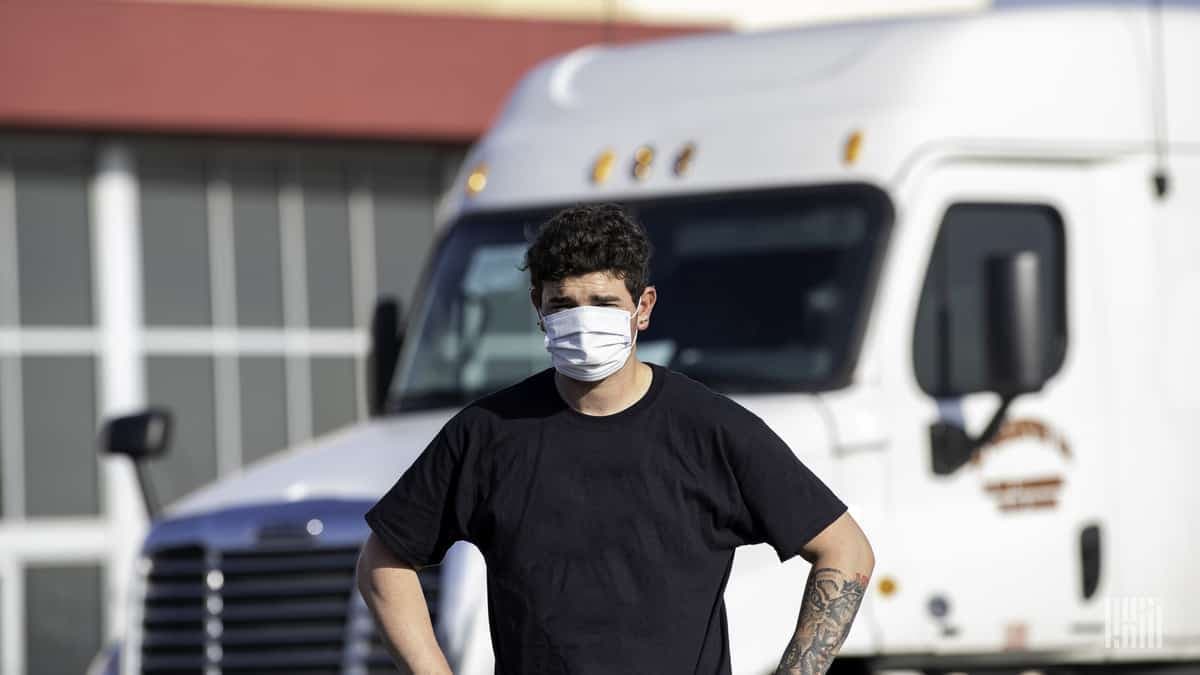- Tech startup Haul connects fleets with on-demand drivers to operate their trucks.
- Around 3 million CDL drivers don’t own their own trucks.
- Haul CEO says the startup seeks to “flip the script on freight assignments so labor is in charge.”
A couple of Uber Freight alumni have launched an on-demand employment platform that aims to boost opportunities for truckless CDL drivers, as labor market changes fuel interest in driver-only business models.
Historically the culture of trucking has centered on the idea of the independent owner-operator in control of his or her destiny, said CEO and co-founder Tim Henry.
“Haul is about how we can get that same relationship to work without the liability of owning a truck,” he said.
The driver as capacity
There are 36 million trucks in the U.S and about 3.6 million CDL drivers, said Toan Nguyen Le, Haul’s CTO and co-founder. But of those drivers, around 3 million don’t own their own trucks.
“The problem is not the truck,” Le said. “It’s not having the driver in that truck.”
Haul fills that gap with what is essentially a modern-day staffing service: a digital service that connects fleets with a qualified pool of on-demand drivers to operate their trucks.
Truck driver temp agencies have been around for decades, ranging from large, nationwide players like TransForce to small local businesses. But the industry today is “eerily similar” to the brokerage space 20 years ago, asserts Le, inasmuch as it still relies heavily on manual communication such as phones, faxes and email to hire, vet and deploy drivers.
Haul’s cloud-based service offers drivers and customers a more streamlined, flexible and tech-enabled experience — from giving drivers the option to choose their loads to alerting them via app as to exactly how much money they earned as soon as the job is completed.
Fleets gain access to an all-in-one portal, where they can view available drivers, their qualifications and locations. “It’s almost like a TMS to manage the driver,” Le explained.
Lessons learned
Providing drivers with upfront visibility was one of the lessons the founders learned while working for freight matching disruptor Uber Freight, where Henry worked in operations and corporate strategy. Le, a software engineer, eventually shifted into management, helping launch the Canadian and European markets.
Another takeaway was that much of the initial interest in Uber Freight came from drivers working for the company’s rideshare business.
“That subconsciously lit a spark,” Henry said.
Elaborating on that idea, Le said that while working at Uber he saw a “dormant supply of drivers,” individuals with CDLs who went into trucking but left because they didn’t have as much independence as they expected or the job took them away from their families for long periods of time.
To lure these disenchanted drivers back into the industry, and attract new drivers, Haul is trying to “flip the model of freight assignment to create a platform that puts the labor in charge,” as Henry put it.
Its tactics include finding assignments for drivers within an hour radius of where they live, and bypassing long haul trucking in favor of private, dedicated, local fleets.
‘This is what Uber should have done’
For its customers, Haul takes aim at a trifecta of woes, helping fleets with high driver turnover and unpredictable surges in demand (especially during the coronavirus-fueled e-commerce boom), while offering protection from labor laws targeting trucking’s independent contractor business model.
“Trucking has always been a target for employment misclassification,” said Henry, noting that California isn’t the only state cracking down on the leased owner-operator model.
To “future-proof” the company, Haul has made its drivers W-2 employees, a model he believes can be profitable given labor market and public policy trends.
“This is what Uber should have done,” said Henry.
Uber and Lyft are locked in a battle with the state of California, where courts have ruled the companies must reclassify drivers as employees.
In rideshare, a ready pool of drivers
As FreightWaves reported earlier this year, driving staffing agencies are seeing a surge in business, driven in part by a wave of labor legislation around the country.
Separately, other trucking companies are seeing opportunity in the CDL-equipped rideshare driver, as passenger transport gives way to package delivery in the wake of the pandemic. Earlier this year virtual trucking carrier CloudTrucks teamed up with Uber Freight and COOP by Ryder to help qualifying Uber drivers break into freight.
Drivers without their own equipment can lease a tractor and trailer through COOP by Ryder, a platform that connects fleet managers with idle vehicles to businesses that are looking to rent vehicles. CloudTrucks will pay the vehicle deposit.
Some of the drivers started off renting trucks and have since “graduated“ to leasing or purchasing their first trucks, CloudTrucks CEO Tobenna Arodiogbu told FreightWaves.
“A lot of the drivers going through that program are previously company drivers who have never been able to purchase their own equipment so it’s pretty exciting to see the upward mobility and opportunities that they are creating for themselves and their families,” he said in an email.
LinkedIn for truck drivers
Henry and Le aren’t interested in seeding new owner-operators.
In trucking you can be a direct hire, a company driver, an owner-operator — “or you can be a leased driver,” Henry said. Seeking to professionalize that fourth driver category, Haul’s founders have longer-term ambitions to help build a career path for drivers who don’t own trucks, combining the best of the gig economy’s flexibility with job security, benefits and professional development opportunities, supported by a LinkedIn-style employment platform.
“It’s about how we can get a large swath of that workforce on our platform and become that digital representation of their workspace,” Henry said.
The idea is similar to some tech-enabled warehouse staffing startups that match employers with pre-vetted and screened hourly wage workers, who build their candidate profiles on the platform.
Haul currently has 500 drivers on its platform and is live in several markets across California and Georgia, with plans to expand into Texas this year. The young company closed an initial financing round led by GFC, according to Henry, and plans on raising a formal round in a few months.
Source: Linda Baker at FreightWaves
https://www.freightwaves.com/news/uber-freight-alumni-launch-an-uber-for-freight



